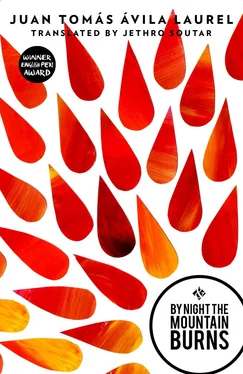Juan Ávila Laurel - By Night the Mountain Burns
Здесь есть возможность читать онлайн «Juan Ávila Laurel - By Night the Mountain Burns» весь текст электронной книги совершенно бесплатно (целиком полную версию без сокращений). В некоторых случаях можно слушать аудио, скачать через торрент в формате fb2 и присутствует краткое содержание. Год выпуска: 2014, Издательство: And Other Stories Publishing, Жанр: Современная проза, на английском языке. Описание произведения, (предисловие) а так же отзывы посетителей доступны на портале библиотеки ЛибКат.
- Название:By Night the Mountain Burns
- Автор:
- Издательство:And Other Stories Publishing
- Жанр:
- Год:2014
- ISBN:нет данных
- Рейтинг книги:5 / 5. Голосов: 1
-
Избранное:Добавить в избранное
- Отзывы:
-
Ваша оценка:
- 100
- 1
- 2
- 3
- 4
- 5
By Night the Mountain Burns: краткое содержание, описание и аннотация
Предлагаем к чтению аннотацию, описание, краткое содержание или предисловие (зависит от того, что написал сам автор книги «By Night the Mountain Burns»). Если вы не нашли необходимую информацию о книге — напишите в комментариях, мы постараемся отыскать её.
By Night the Mountain Burns — читать онлайн бесплатно полную книгу (весь текст) целиком
Ниже представлен текст книги, разбитый по страницам. Система сохранения места последней прочитанной страницы, позволяет с удобством читать онлайн бесплатно книгу «By Night the Mountain Burns», без необходимости каждый раз заново искать на чём Вы остановились. Поставьте закладку, и сможете в любой момент перейти на страницу, на которой закончили чтение.
Интервал:
Закладка:
But the Padre told her to go in peace and those wicked people showed her no mercy. Even watching her leave the church to face the crowd didn’t soften the Padre ’s heart, and so the mob decided to see things through to the end. I’ve already said what happened when we realised those men, and women, and children, planned to see things through to the end: we decided not to witness it. For most people, beating a woman to death was no small thing. But it was what they wanted, perhaps what they’d sworn to do beforehand, come what may. And they became increasingly hard-hearted and they saw it through to the end. And what if they thought the Padre had given them permission to do so by letting the woman out to face their sticks? To face the end? They went on beating her until she died at their hands. It was something we had never seen before on the island, nor heard an adult tell of ever happening before. They killed that woman.
Such a terrible thing could not have happened in sunlight, although the sun had been shining earlier on in the day. Terrible things tend to happen in the late afternoon, when the sky turns gloomy in the absence of the sun. They chased that woman all around town until she was dead, killed before everyone’s eyes! They killed her running right through the big village, and so the evil took hold of the big village and entered everyone’s spirit. It was the first time such a thing had happened and nobody knew what to do about it. Dios mío , they killed that woman, they beat her with sticks until she died at their hands! Before that, they thrust a stick into her nakedness, as if to remind her that she had children, two daughters in fact. And do you know who those two daughters were? The two sisters who’d gone up to the plantations and accidentally set fire to the Pico. That fire had been a terrible accident, but all the adults, and maybe even the sisters themselves, knew that it was also a terrible omen. Which was why they’d cried not so much for the fire itself but for what they thought would come next.
That woman was killed and a sense of foreboding spread through the big village, as if the evil was spreading. As if what had happened hung in the atmosphere and was breathed in, though never talked about. Such an awful thing should have been talked about everywhere in the village, but it couldn’t be, at least not on the day it happened, and not in the days that followed. Nobody knew what to say. And before we’d had a chance to fix what had happened in our minds, the evil spread throughout the island and death spread its wings over the village. For weeks, indeed for months, the spirits of death and evil had our Atlantic Ocean island in their grip. In fact it was one evil after another. First there was the fire, seen by many as an omen of more evil to come. Then the killing of that woman, something that had never happened before on our island, and seen by the adults as a warning that untold pain and misery were on their way. And no ordinary adults either but certain adults who had special powers and could see into the future. These people saw everything. And they walked the streets in tears saying that they wouldn’t tell, that their ‘leaders’ were pounding them to make them tell, but they wouldn’t tell of what terrible future lay ahead of us. That’s what the adults who talked to my grandmother said. Something was going to happen, something was going to happen, and the women who saw things from the future, because they talked to the departed, were supposed to inform everybody of what this terrible thing was, but they refused because it was so bad. But something terrible already had happened! Surely not more? Yet if the clairvoyants said it would happen, it would happen, it was inevitable. What fear I felt during those days! And before I’d had time to think about the terrible thing that had already happened, to try and understand why the whole village had stood by and watched as the Devil ran amok among us, the air turned thick and the skies darkened over everyone as we waited, waited for something we didn’t want to come. And I was very, very afraid.
What came next began when a man who was strong and healthy one day dropped down dead the next. He’d seemed perfectly well, chatting contentedly with numerous people, and then, when night came, he asked someone to accompany him to the beach so he could relieve his belly. He asked his wife, who was the only person who could be expected to accompany him to the beach at such an untimely hour. This was because it wasn’t just a matter of going to the beach, any old part of it, but of going to a bit beyond the vidjil , where the men beached their canoes. The man felt a desperate need to go and he left home accompanied by his wife. They made their way through the darkness and reached the section of the shore where people from that part of the big village went to satisfy their needs, and the man pulled his trousers down and squatted. Time passed, sufficient time for him to have satisfied his need, but he remained squatting.
‘You nearly finished?’ his wife asked.
‘No,’ he answered, and although it was only a monosyllable, the way he pronounced it was enough for his wife to know her husband wasn’t well.
‘Everything all right?’ she said, from where she was waiting a few steps away.
But the man gave no answer, other than a series of groans, groans that suggested all was not right with the relieving of his belly. Ay! ay! aaay! Emptying his belly brought sharp pangs of pain, and each pang made him groan. He was getting cramps. Ay! huy! huy! And he held his hands to his gut, a gesture his wife couldn’t make out, for the moon had not been seen for several weeks and the beach was in total darkness. The pain continued, until finally he summoned up the strength to make his way over to where the sea washed onto the sand, and there he performed the basic ablutions; that’s to say, he washed himself in the splash of the waves … He still felt pangs of pain but he thought he ought to go back to the house, so he set off home, preceded by his wife. As they turned onto the road that led to their house, the man had another attack of cramps and he had to stop. He leaned on a rail outside a house and bent over, holding his stomach with his free hand. Aay! huy! he wailed in pain. Then he had a sudden, desperate need to go, and he tried to hurry back down to the shore to satisfy the need, but he only made it halfway along the path before he had to pull his trousers down and squat. This was totally unacceptable behaviour; he and his wife both knew this. A person couldn’t just do his business anywhere, certainly not somewhere that wasn’t set aside or used for such a purpose, no matter what the time of day or circumstances. And especially if that person was an adult. It was simply unacceptable. And because they both knew this, his wife knew something was seriously wrong with her husband. And she caught up with him and asked him if the cramps were persisting. But the man no longer had the strength to answer. He suddenly felt a great need to sleep and, without even washing himself, he pulled up his trousers, whimpering in pain. He could no longer walk, at least not without great difficulty.
‘I’m dying,’ he said.
So his wife leaned forward to offer him her back and she carried him on it, despite her frailty. With considerable trouble, they made it back to the house and laid him down on the communal bed. He started to get cold sweats and suffered wave after wave of cramps, cramps connected to a constant need to relieve his belly. But he could no longer get outside to satisfy the need and so he had to do it right there, in the confined space of the sleeping room. With all the noise, the neighbours realised something was going on and they came round to find out what the problem was. The man was periodically forced to make use of a chamber pot, which his wife took outside at daybreak. Personal business, very personal business, is best dealt with before anyone is out on the streets. So the woman went out of the house carrying the chamber pot, covering it partially, or hiding it under a length of cloth she usually wrapped around her head and back. She emptied the chamber pot wherever she could and went down the path to the shore to clean up the physiological remains her husband had left behind the previous night, and as she bent over she felt a slight cramp, but soon recovered. When she got home, she found her husband with white, sunken eyes, dry lips and only the thinnest thread of breath. And not a single part of the bed was dry, because her husband had suffered multiple attacks of diarrhoea while she’d been away. The woman called the neighbours because, being an adult, she knew what those white eyes might mean. The man no longer had anything to say for himself, or if he did he was no longer able to say it. He no longer knew where he was. His wife sensed his condition deteriorating and she called out to tell him to hang on in there. But the man made only the slightest of gestures, just enough to show he’d heard his dear wife, that he wanted to remain in this world. Remain with her. It was his final gesture. A few minutes later he was still lying on the bed, but nobody in the house could say for sure whether he was still in this world or whether he’d gone over to the other. His wife had already peered into the gloom and allowed a few furtive tears to escape. The neighbours told her not to despair, that there was still hope. And some of them went out to call for the doctor. They called for the doctor because they thought he’d be able to tell them what was happening, not because they thought he’d have anything at the hospital he could treat the man with. For if the island’s hospital had any medicine at all, it was unlikely to be of any use for this case. They called him, he came, he saw the state of the bed, looked at the sick man, felt him, opened his eyes, opened his mouth and said nothing. Or rather he said that the man should be taken to the hospital. Perhaps the doctor had something there to be used in emergencies. The question was how to get the man to the hospital, because on our island the seriously ill are usually taken to hospital first by canoe, then on someone’s back, but that man had one foot in the other world and was in no state to be put in a canoe or carried on anyone’s back. And besides, he was not a young man. But everyone could see life escaping from him, so they summoned four men and those four men took hold of the four sides of the sheet he lay on and they carried him all the way through the village to the hospital. During the journey, the first rays of the sun that would shine that day beamed down on the man’s face and he made an attempt to open his eyes. The four men carrying him, on a sheet where he’d done his business, saw this and had a vague sense of hope that their efforts would not be in vain. And they reached the hospital. They passed the Padre en route, who had already been informed of the man’s spiritual needs and told that he looked set to leave this life for the next unless Dios intervened, and if Dios didn’t intervene, it would be better if he was received by Providencia with his last rights administered. The Padre followed the procession to the hospital and there he made the sign of the cross on the soles of the man’s feet and rubbed Santo Óleo into their skin. The man’s wife and the people who’d accompanied her saw this. And they saw that the soles of the feet receiving the holy unction were very pale. But had they really seen enough soles of feet to know that these ones were especially pale?
Читать дальшеИнтервал:
Закладка:
Похожие книги на «By Night the Mountain Burns»
Представляем Вашему вниманию похожие книги на «By Night the Mountain Burns» списком для выбора. Мы отобрали схожую по названию и смыслу литературу в надежде предоставить читателям больше вариантов отыскать новые, интересные, ещё непрочитанные произведения.
Обсуждение, отзывы о книге «By Night the Mountain Burns» и просто собственные мнения читателей. Оставьте ваши комментарии, напишите, что Вы думаете о произведении, его смысле или главных героях. Укажите что конкретно понравилось, а что нет, и почему Вы так считаете.












